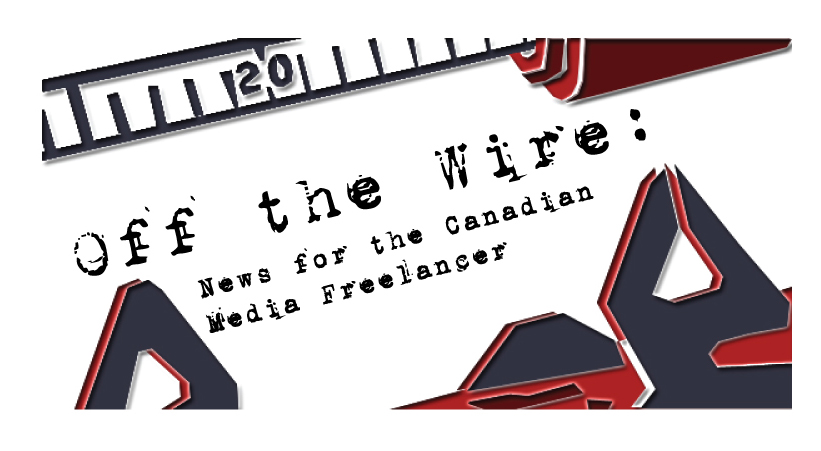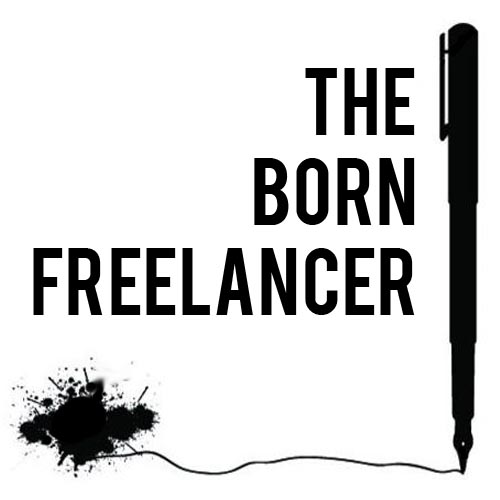Applications open for the 2017 Canadian Nieman Fellowship
Applications are now open for the 2017 Martin Wise Goodman Canadian Nieman Fellowship. The deadline for applications is January 6, 2017.
The fellowship offers a one-year sabbatical at Harvard University — including tuition, stipend and medical expenses — to a working Canadian journalist. Freelancers, photojournalists, editorial cartoonists, columnists, filmmakers and broadcasters are all invited to apply.
Applications must include two essays, a professional profile and study plan, work samples, and three letters of recommendation.
More details about the application process can be found on the Canadian Nieman website. You can email canadiannieman@gmail.com with any questions.
Off The Wire: News for the Canadian media freelancer Oct 4-11
Once a week, we gather stories about the media business, journalism, writing, publishing, and freelancing—with a Canadian focus—and share them in Off the Wire. Who needs a water cooler?

From Canada:
- To script or not to script: that is the audio storyteller’s question [The Doc Project]
- Applications open for Martin Wise Goodman Canadian Nieman Fellowship [Canadian Magazines]
- Halifax startup to focus on long-form journalism [Masthead]
From The U.S. and beyond:
- 5 Secrets to Becoming a Six-Figure Freelancer [Mediabistro]
- 12 Awesome Websites to Kick Your Freelancing Into High Gear [Mediabistro]
- How a custom freelance contract can help you save or earn money [Freelancers Union]
- Want to Write for Magazines? Pitch This Section First [The Write Life]
- How journalists can start creating a personal brand online [Journalism.co.uk]
- What 200 Rejections Taught Me About Being a Freelance Writer [The Write Life]
- 10 terms every freelance writer should know [Mediabistro]
- Can Finally Doing Your Chores Help You Write More? [The Write Life]
Recently on Story Board:
- Ali Mustafa Memorial Award for freelance photojournalists application deadline December 15: An award granted to young photojournalists in honour of a Canadian freelance photographer killed in Syria is now accepting applications…
- Expanding your freelance portfolio: Today, most people see me as a magazine writer. But if I were to rely solely on the income I generate from writing magazine articles, the cupboard would be pretty bare. For me, the key is to diversify…
Spot a story you think we should include in next week’s Off the Wire? Email the link to editor@thestoryboard.ca or tweet us at @storyboard_ca.
Ali Mustafa Memorial Award for freelance photojournalists application deadline December 15
An award granted to young photojournalists in honour of a Canadian freelance photographer killed in Syria is now accepting applications. The deadline to apply for the Ali Mustafa Memorial Award for People’s Journalism is December 15th, 2016.
The award, established in 2015, is given in honour of Ali Mustafa, a Toronto freelance photojournalist who was killed in Aleppo in March 2014. His work had been featured in The Guardian, Le Nouvel Observateur, Journal du Dimanche, Les Echos, and The Times of London. He was only 29 years old when he was killed.
The award was set up by the Ali Mustafa Memorial Collective as a way to honour his memory and pay tribute to the work of freelance photographers. Applicants are asked to submit a proposal for a project that helps increase awareness of social justice issues.
The winner of the award will receive a maximum of $3,000 to cover costs such as travel expenses, equipment, training, visa, insurance, and living expenses. The winner will also receive a one-year membership in the Canadian Media Guild’s Freelance Branch and a one-year professional membership in the News Photographers Association of Canada.
For more details about the award and how to apply, visit rememberinalimustafa.org. To contact the organizers, you can email AliMustafaAward@gmail.com.
Expanding your freelance portfolio
By Sandra Phinney
I’ll never forget the day I announced to my husband, “Barrie, I’m going to be a freelance writer.” The look on his face was priceless. You see, 19 years earlier I’d said, “Barrie, I’m going to be a farmer.”
That actually happened; I grew 10 acres of organic fruit and vegetables—before the word “organic” meant anything to anyone—and lost money for 16 years. We had to sell the farm and start over. So you can imagine the look on my husband’s face when I made the grand announcement that I intended to be a freelance writer.
To complicate matters, when I told Barrie I intended to be a freelance writer, I was 54, and didn’t posses any writing credentials or track record.
I wasn’t a trained journalist; I wasn’t a household name in the magazine or newspaper world; I didn’t even know what a query or tear sheet was. I knew dilly squat. But there’s something to be said about starting from scratch. Much like jumping in the deep end of a pool when you don’t know how to swim—it’s do or die.
Today, most people see me as a magazine writer. But if I were to rely solely on the income I generate from writing magazine articles, the cupboard would be pretty bare. For me, the key is to diversify. That means I not only diversify the kind of writing I do (travel and lifestyle to business, health, the environment, profiles, book reviews … ad infinitum) but I also entered the realm of corporate writing.
What have I learned?
Skills are transferable.
Off The Wire: News for the Canadian media freelancer Sept 27-Oct 3
Once a week, we gather stories about the media business, journalism, writing, publishing, and freelancing—with a Canadian focus—and share them in Off the Wire. Who needs a water cooler?

From Canada:
- Rogers Media reduces Maclean’s, Chatelaine publication schedules and takes four magazines online only [J-Source]
- Rogers Media goes digital-first with a bang in its magazine division [Canadian Magazines]
- Postmedia closes 24 Hours Vancouver office, but free paper to keep printing [J-Source]
- Canada’s access to information regime is systemically broken, says panel [J-Source]
- A new daily dawns on Vancouver Island [Nanaimo Bulletin]
From The U.S. and beyond:
- Want to Read More? Do it Efficiently With These Three Apps [The Write Life]
- If a Lawsuit Can Bury Gawker, What Could It Do to a Freelancer? [The Freelancer]
- Why journalists should learn how to code [Journalism.co.uk]
- 5 reasons to share your work-in-progress [Freelancers Union]
- 3 simple tips for better communication with your writing clients [The Write Life]
Recently on Story Board:
- Freelancer meet-up in Vancouver on October 3: Vancouver-area freelancers, come and meet some colleagues for a freelancers’ social night on Monday October 3rd at 6 p.m. at Central City Brewing…
- Are you owed money by Venture Publishing?: In December of 2013 we posted a story about Venture Publishing in Alberta. We’d been hearing from a lot of freelancers who were having trouble getting paid for their work in a timely manner…
Spot a story you think we should include in next week’s Off the Wire? Email the link to editor@thestoryboard.ca or tweet us at @storyboard_ca.
Freelancer meet-up in Vancouver on October 3
Vancouver-area freelancers, come and meet some colleagues for a freelancers’ social night on Monday October 3rd at 6 p.m. at Central City Brewing (871 Beatty St).
CMG Freelance members and non-members are all welcome. Join us for an evening of conversation, commiseration and celebration of the freelance lifestyle. We’ll even have door prizes! You could win one of our ‘Exposure Bucks’ t-shirts or a ‘Freelancer’s Toolbox’ notepad.
Please RSVP this week to freelance@cmg.ca to let us know if you can make it. Hope to see you there!
Are you owed money by Venture Publishing?
 In December of 2013 we posted a story about Venture Publishing in Alberta. We’d been hearing from a lot of freelancers who were having trouble getting paid for their work in a timely manner.
In December of 2013 we posted a story about Venture Publishing in Alberta. We’d been hearing from a lot of freelancers who were having trouble getting paid for their work in a timely manner.
Three years later, we’re still hearing from freelancers who are waiting as long as 18 months for their invoices to be paid.
Is Venture Publishing remiss in paying for your work in Alberta Venture, Alberta Oil, or any of Venture’s custom publications? If so, the Canadian Media Guild’s Freelance Branch would like to hear from you.
Please email Branch President Don Genova at freelance@cmg.ca. All correspondence will be kept confidential.
The CMG’s Freelance Branch works to improve conditions for freelancers (minimum rates, predictable payment cycles, contract language and more) and garner respect for freelance contributors from peers and engagers.
Off The Wire: News for the Canadian media freelancer Sept 20-26
Once a week, we gather stories about the media business, journalism, writing, publishing, and freelancing—with a Canadian focus—and share them in Off the Wire. Who needs a water cooler?

From Canada:
- Getting comfortable with being uncomfortable is part of a journalist’s job, say panelists [J-Source]
- Magazine industry fight over too many awards leads to split – and more awards [Globe and Mail]
- Memo: CBC Aboriginal to be renamed CBC Indigenous [J-Source]
- Canadian Magazine Awards unveiled by Magazines Canada [Canadian Magazines]
- UBC, Globe and Mail win 2016 Online Journalism Awards [J-Source]
- National Magazine Awards announces important changes to board and procedures [Canadian Magazines]
From The U.S. and beyond:
- How One Freelancer Broke Into ‘The New Yorker’ From Afar [The Freelancer]
- 7 ways to be a more productive freelance writer [Mediabistro]
- Freelancers included in NYC anti-discrimination legislation [Freelancers Union]
- Telling visual stories: Photography tips for journalists [Journalism.co.uk]
- ‘Pause, pace, pattern, register’: The power of words in radio storytelling [Journalism.co.uk]
- 5 Keys to Writing a Q&A Piece People Actually Want to Read [The Freelancer]
- How journalists can better protect themselves from doxxing [Journalism.co.uk]
- 7 Comedy-Writing Techniques Nonfiction Writers Can Use [The Write Life]
- The 5 Required Courses You’d Take if You Majored in Freelancing [The Freelancer]
Recently on Story Board:
- The 5-Minute Freelancer Q&A #32 — Jennifer Van Evra: Jennifer Van Evra is a Vancouver writer, broadcaster and university instructor. Her work has appeared in publications including the Globe and Mail, the Vancouver Sun, Vancouver magazine, the Georgia Straight, Mother Jones and more…
- The Born Freelancer on Embracing Procrastination: I can’t believe I haven’t written about this yet. I guess I’ve just been… putting it off. Which makes perfect sense because most of my friends don’t call me “The Born Freelancer.” To them, I’m more “The Born Procrastinator”…
- National Magazine Awards Foundation announces new initiatives: The National Magazine Awards Foundation announced a number of changes this week. In a press release yesterday, the foundation said that the changes are designed to “maintain and advance the NMAF’s 40-year status as the gold standard of creative excellence”…
Spot a story you think we should include in next week’s Off the Wire? Email the link to editor@thestoryboard.ca or tweet us at @storyboard_ca.
The 5-Minute Freelancer Q&A #32 — Jennifer Van Evra
In this regular feature, Story Board asks Canadian writers to share a few details about their work habits and their strategies for navigating the ups and downs of freelance life.
Jennifer Van Evra is a Vancouver writer, broadcaster and university instructor. Her work has appeared in publications including the Globe and Mail, the Vancouver Sun, Vancouver magazine, the Georgia Straight, Mother Jones and more.
Since 2000, she has been a producer, reporter and broadcaster with the Canadian Broadcasting Corporation, where she has covered everything from current affairs to music, and produced award-winning programs, series and documentaries.
She also teaches freelance article writing at the University of British Columbia’s Writing Centre. In 2013, she was awarded the John K. Friesen Excellence in Teaching Award.
She took the time to speak with Story Board last week about pitching, being brave, and going the extra mile.
What would you say is the single most important piece of advice that you give your writing students?
I guess the main point I try to make again and again is that this is completely doable. Early on in my career I had a lot of people that would say “Oh freelance writing is impossible, nobody makes a living doing that. You have to have another job, you have to do something else.”
And fortunately I knew some other freelance writers who were more experienced than I was who said “Just hang on. It’s about perseverance and hard work.” If you can make it through the rough part at the beginning where you’re sort of fumbling through and pitching stories and they’re getting rejected, things get much easier.
Read the rest of this post »
The Born Freelancer on Embracing Procrastination
This series of posts by the Born Freelancer shares personal experiences and thoughts on issues relevant to freelancers. Have something to add to the conversation? We’d love to hear from you in the comments.
I can’t believe I haven’t written about this yet.
I guess I’ve just been… putting it off.
Which makes perfect sense because most of my friends don’t call me “The Born Freelancer.” To them, I’m more “The Born Procrastinator.”
Today I’m here to testify that chronic procrastination need not be a deal-breaker when contemplating the freelance lifestyle.
In fact, once recognized and properly harnessed, procrastination can be turned from a negative into a positive – another useful tool in the freelancer’s arsenal. Don’t believe me? I am living proof of it.
Procrastination
First, let’s define it. It usually means to postpone or to delay doing something. For me, it means a subconscious prioritizing of actions I need to take.
And some activities I am simply not yet ready to enact.
Of course there are times procrastination can be a distressing hinderance. But once you understand why you are procrastinating you can use that knowledge to make many of your subsequent actions more successful.
Read the rest of this post »





